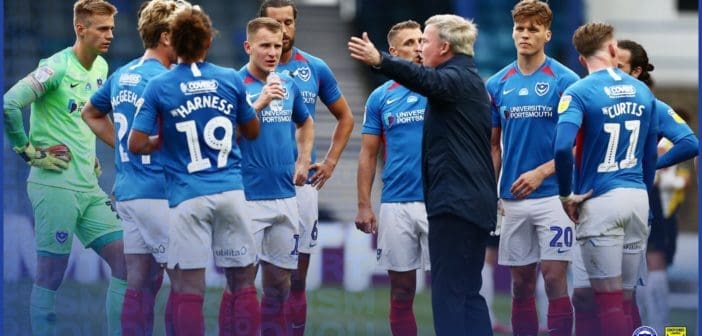“When you strip away all the layers one by one, not much remains to discover,” psychologist and author James Robson once wrote.
Robson had concurred human beings answer the most critical questions posed to themselves when enduring a state of precarious transition. When all in-built defensive mechanisms are gone and the difficult questions are still left unanswered, you will thus see the true mark of an individual or group.
Two decades later, Robson’s theories remain pertinent. On Friday evening, Portsmouth hosted Oxford United in the first leg of their League 1 play-off semi-final. During the season, nothing could separate the two sides. They were virtually identical in every which way. They had played the same amount of games, accrued the same amount of wins, the same amount of draws and the same amount of losses. But, in truth, all of what’s gone before is meaningless, when you’re playing in the midst of a worldwide pandemic.
So, in a match that would resemble some kind of sociological experiment, what happens to the natural pressures of professional football when you strip back the crowdless layers and reveal all?
The first concept pitched for the inaugural edition of ‘Fratton Park: Behind close doors’ was the thought of having cardboard cut-outs as supporters. Actual living, breathing, humans were substituted by 1078 artificial figurines by the Portsmouth groundstaff. In a year where the far-fetched has become the probable and the normality a distant utopia, Pompey sought anyway how to imitate their notorious home support, so often conducive to the side’s aggressive, volatile brand of football.
The Fratton stands had long underpinned the team’s fortunes on the pitch, possessing a distinct ability to influence momentum in games and conjure up spirited fightbacks. The compact, archaic ground could make even the best footballers fall in line of the Fratton fire.
This season, albeit not welcoming Europe’s finest footballers to the south coast, the preserved spirit of the stadium has never been so apparent. Kenny Jackett’s men have recorded the best home form in the league, accumulating 42 points in their 18 matches. To underline the holistic relationship between players and home support, the team have taken 24 points fewer when away from home.
The early exchanges were typical Pompey. Crowd or no crowd, the first five minutes were an all-out slugfest, the type of blow-to-blow football Portsmouth revel in. The lack of noise made for quite the extraordinary spectacle too, with the sound of Ronan Curtis rattling the post adding to the purity and simplicity of it all. It was soon apparent the early squeeze had rattled Oxford.
This prompted a few choice words from boss Karl Robinson, somewhat confounded by how taken aback his side were with Pompey’s early aggression. Soon after urging his players to “calm down,” Robinson was the next one shaken and stirred, screaming and wagging at the fourth official to do his “fucking job.”
The first League One game in 115 days saw its first goal just after the half hour mark, with Curtis turning home. An unusual chain of events then ensued. First the strike and subsequent wheeling away to celebrate in front of absolutely no-one seemed peculiar. The strike was then met with a tame, rather polite, ripple of applause. The only emotion witnessed was from the six fans on a zoom call, all located on the big screen, all wearing Pompey blue. But even their celebrations were hardly routine, the power of the internet ensuring there were to be at least a 10 second delay before seeing any sort of triumph.
Curtis’ goal wasn’t met with a sudden seismic shake of the rattling Fratton stands, nor the catalyst of one goal quickly becoming two. The goal didn’t change the fact that the empty seats still looked solemn and the ground withdrawn. With no crowd able to put a vice-like grip on Oxford and leave them to drown, the visitors were soon beginning to elicite a response of their own.
Jackett and those watching on knew this. They knew they could not keep Oxford under the pump and put the frighteners on them. How could they? There was no one in the ground. Yes, it was a play-off match and yes the game had the ability to shape the future of the two sides, but how could players feel the natural weight of expectation with cardboard cut-outs posing as fans for goodness sake?
With Jackett and even some players sensing this, they attempted to generate an atmosphere intrinsically, some way of keeping the intensity high and the adrenaline pumping through themselves. It is a hardened, old-fashioned belief that the more pressure you apply on a performance-based individual or collective, the better they perform. While it is perhaps evolving to be somewhat of an archaic, stubborn view, it ties in perfectly with the old adage ‘pressure makes diamonds;’ the heavier the burden, the more you naturally push to release it, thereby provoking a positive response.
But the increased shouts and demands didn’t work either. Portsmouth looked laboured, appearing to lack the physical and technical skill to put an unsettled Oxford, who had a manager that was still trying to contend with his frequent fits of rage, to the sword.
In the uneventful minutes that followed, Pompey soon surrendered their superiority. Unable to muster their second wave of gusto, Oxford hit back with Marcus Browne squirming the ball underneath goalkeeper Alex Bass to square the contest. It was a goal that epitomised the game. A slow, strained effort found the net and left everyone else wondering what the hell just happened.
It was a case of as you were in the second half. Both team’s intentions and exertions could not be faulted, but they just did not have the inherent energy to keep standing toe-to-toe with the other and not get hurt. “If the crowd were in here, Pompey would be chasing the game harder than they are now,” the BBC Oxford radio commentator flawlessly summarised.
Oxford probably didn’t mind. In fact, they were probably grateful. It must have felt a message had been sent from the Gods when hearing they would travel to the most destructive, ruthless ground in the division and play the biggest match of their season behind-close doors. Robinson wouldn’t have to deliver the most common “quieten down the crowd straight away” cliche known to the Fratton away dressing room or go on about how potentially fatal the incessant home support could be for his men.
And for a team that likes to play out from the back and work intricate passes through the thirds, not having four packed-out corners of Fratton Park all screaming at you must be particularly helpful.
What played out on Friday evening was a small microcosm of an experiment that is being witnessed all over the world. Adapting to the ‘new normal’ is tough, but is gradually becoming a habitual feature in all of our lives. The best indication of this was in the dying embers of the game, when the fourth official held up the board signalling that there would be five additional minutes of time.
The harmonic cry of the home crowd shouting “come on!” had vanished. Instead it was met with a stone cold silence. Much like what accompanied the previous 89 minutes.
Follow us on Twitter @ProstInt
EFL
News
![Prost International [PINT]](https://prostinternational.com/wp-content/uploads/2021/08/PINTtFontLogoRoboto1536x78.jpg)



